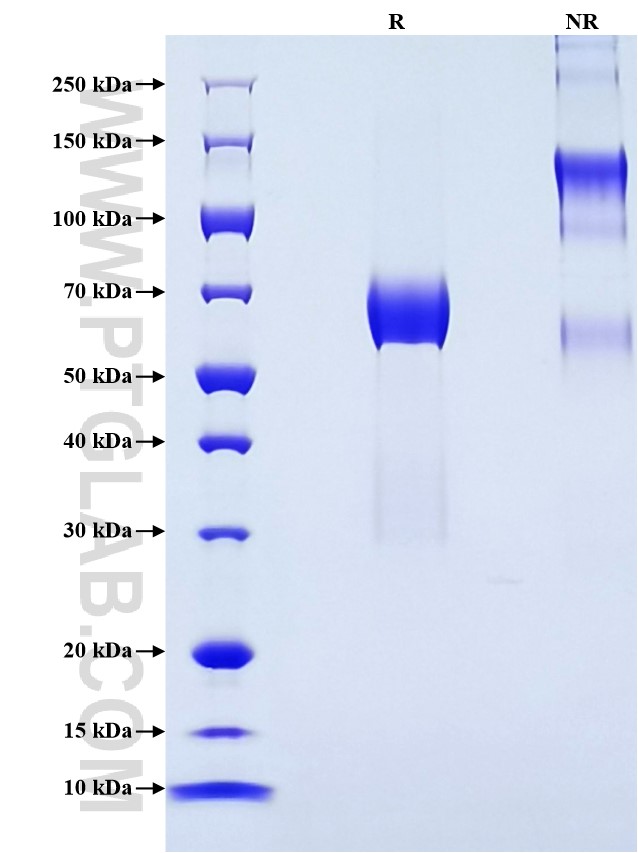Recombinant Human DLK1 protein (rFc Tag)
种属
Human
纯度
>90 %, SDS-PAGE
标签
rFc Tag
生物活性
未测试
验证数据展示
产品信息
| 纯度 | >90 %, SDS-PAGE |
| 内毒素 | <0.1 EU/μg protein, LAL method |
| 生物活性 |
Not tested |
| 来源 | HEK293-derived Human DLK1 protein Ala24-Pro297 (Accession# P80370-1) with a rabbit IgG Fc tag at the C-terminus. |
| 基因ID | 8788 |
| 蛋白编号 | P80370-1 |
| 预测分子量 | 55.2 kDa |
| SDS-PAGE | 60-70 kDa, reducing (R) conditions |
| 组分 | Lyophilized from 0.22 μm filtered solution in PBS, pH 7.4. Normally 5% trehalose and 5% mannitol are added as protectants before lyophilization. |
| 复溶 | Briefly centrifuge the tube before opening. Reconstitute at 0.1-0.5 mg/mL in sterile water. |
| 储存条件 |
It is recommended that the protein be aliquoted for optimal storage. Avoid repeated freeze-thaw cycles.
|
| 运输条件 | The product is shipped at ambient temperature. Upon receipt, store it immediately at the recommended temperature. |
背景信息
DLK1, also named PREF1, FA1, or pG2, is a transmembrane protein belonging to the epidermal growth factor (EGF)-like superfamily. It contains six EGF-like repeats in the extracellular region. DLK1 is abundant in preadipocytes and regulate adipocyte differentiation negatively. Deficiency of DLK1 gives rise to growth retardation and accelerated adiposity in mouse model. Expression of DLK1 is found in tumors with neuroendocrine features that implies DLK1 may be involved in neuroendocrine differentiation. It has been reported overexpression of DLK1 could lead to the development of metabolic abnormalities by impairment of adipocyte function in mice. The gene of DLK1 maps to chromosome 14q32, and encodes a 383-amino acid protein with a calculated molecular mass of 41 kDa. In preadipocytes, multiple discrete forms of DLK1 protein of 45-60 kDa are present, owing in part to N-linked glycosylation.
参考文献:
1. Smas CM, Sul HS. (1993) Cell. 73(4):725-34. 2. Laborda J, et al. (1993) J Biol Chem. 268(6):3817-20. 3. Lee K, et al. (2003) J Clin Invest. 111(4):453-61.
